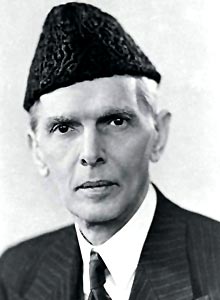 Direct Action Day of 14th August 1946 was declared as the day of protest and meetings to propagate the Muslim demand, to explain the Muslim League`s attitude towards Cabinet Mission`s offer and to condemn the conduct of Congress. To the Muslims it appeared that the government by inviting the Congress to form the Interim Government had broken with the past tradition of protecting the Muslims who had trusted the British during the Civil Disobedience and Second World War. The city of Calcutta (now Kolkata) saw the fierce days of riots. In Kolkata the day began with public demonstrations, closing of shops and hoisting of Muslim League flag.
Direct Action Day of 14th August 1946 was declared as the day of protest and meetings to propagate the Muslim demand, to explain the Muslim League`s attitude towards Cabinet Mission`s offer and to condemn the conduct of Congress. To the Muslims it appeared that the government by inviting the Congress to form the Interim Government had broken with the past tradition of protecting the Muslims who had trusted the British during the Civil Disobedience and Second World War. The city of Calcutta (now Kolkata) saw the fierce days of riots. In Kolkata the day began with public demonstrations, closing of shops and hoisting of Muslim League flag.
Background of Direct Action
Direct Action Day came at the backdrop of the dissatisfaction which was evoked by the Cabinet Mission Plan of 1946. As the mission invited the Congress to form the Interim Government, it at the same time threatened the Muslims league of their political stability and their relevance in placing the demand for a separate independent nation called Pakistan. On 16th June the Mission under the pressure of the League placed another proposal of creating two nations with one as Hindu majority while the other as Muslim majority state which was summarily rejected by the Indian National Council. This provoked Muhammad Ali Jinnah who decided to boycott the Constituent Assembly and go for a declaration of Direct action day on 14th August 1946.
On July 1946 Jinnah in a press conference declared his positive intention to demand the creation of Pakistan, on whose rejection he boycotted the Constituent Assembly and refused to participate in the Interim Government. He further asserted that the League was preparing to launch a protest with mass participation and if the league is not granted its demand for Pakistan it will then launch Direct Action all over the country. On16th August 1946, Jinnah declared the day as a Direct Action Day which was intended to unfold direct action in achieving Pakistan. This formed the base of the fiercest communal atmosphere which engulfed the entire nation in a year before India gained complete Independence.
Communal Tension and Riots of Calcutta
Communal tensions and followed up riots were the immediate reaction of Jinnah`s speech for Direct Action. The most affected was the city of Calcutta where the mixed population of both the Hindus and Muslim were at direct conflict with each other. The riots were provoked through the well known public meeting addressed by the then Bengal Chief Minister Huseyn Suravardy and his assistant Khwaja Nazimmudin. This provoked the whole mass of Muslim population who slaughtered Hindus including the innocents who had nothing to do with the high level politics. The toll of riots were stretched from all corners of Calcutta including north, south and central which marked the biggest bloodshed ever taken place in India. The riots ultimately came to a halt after the Viceroy deployed 5 battalion of British and 4 battalions of Gurkha soldiers on 21st August 1946.
Reaction of Hindus
Hindus, on the other hand, to protect themselves and to resist the Muslim crowd purchased arms and ammunitions from the American soldiers during the war which were being used. Acid bombs were manufactured and stored in the Hindu owned factories and the Hindu blacksmiths were prepared to manufacture spearheads and other weapons.
Reaction of Direct action day
Direct Action Day was condemned heavily from all corners of the country. As an immediate reaction of the provocative speech delivered by Jinnah, series of riots engulfed the nation from many areas. The riots also rolled over to surrounding areas of United Provinces, Bihar and other parts of West Bengal like Noakhali. Inspite the severe brutality this event could not condemn the League and restrict its political ambitions. On the contrary it gave way to the League which was able to mark its political importance.
Thus, the riots which followed after the call of Jinnah for a direct action was one of the bitter experiences of Indian freedom struggle. The Great Calcutta Killing was the most shocking and alarming which shattered the nation and particularly Kolkata for ages.



















